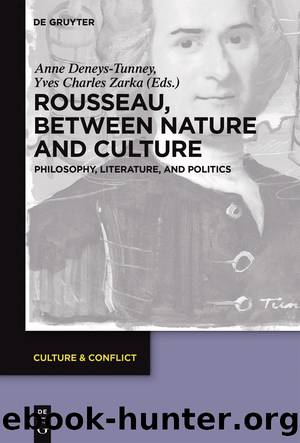Rousseau Between Nature and Culture by Anne Deneys-Tunney Yves Charles Zarka

Author:Anne Deneys-Tunney, Yves Charles Zarka
Language: eng
Format: epub
Publisher: Walter de Gruyter
Published: 2016-11-15T00:00:00+00:00
There is a paradox of sovereignty in Rousseau. The Social Contract from 1762 arguably provides the definitive expression of the modern conception of politics, namely an egalitarian conception of association rooted in popular sovereignty: the only sovereign in a legitimate polity is the people itself. In other words, Rousseau provides an entirely immanent conception of political legitimacy. This finds clearest expression in his conception of law: namely, the only law that can be followed in a legitimate polity is the law that gives itself through acts of the general will. In other words, law must be self-authorizing and correspond to autonomy.
Yet â and hereâs the paradox â what authority can law have if it is self-authorizing? This question leads Rousseau to the famous problem of the legislator: namely, in order for law to have authority over a community it becomes necessary to posit the existence of a legislator who stands outside that community: a foreigner, a stranger who initiates the constitutional arrangements of a polity, as Rousseau himself might have done with his plans for Corsica and Poland. Namely, the autonomy of law needs a heteronomous source in order to guarantee what some see as lawâs empire.
The dependence of an immanent conception of legitimacy on some transcendent instance becomes even more acute in Rousseauâs treatment of the relation between politics and religion, which is my focus here. On the one hand, in the early draft of The Social Contract, the Geneva Manuscript, Rousseau insists that the question of legitimate political institutions is a philosophical issue that must not be resolved theologically. Yet, on the other hand, the published version of The Social Contract concludes with an infamous discussion of civil religion, namely those political articles of faith â which include a belief in a beneficent deity and an afterlife â that Rousseau believes are necessary in order to provide the motivational set of moral intuitions that will affectively bind together a polity and ensure that citizens take an active interest in the process of collective legislation that constitutes a self-determining political life. Such is the source of Rousseauâs appeal to Voltaire in 1758 that there should be a catechism of the citizen, analogous to the articles of Christian faith, that would underpin the functioning of any legitimate polity.
Following Louis Althusserâs essay on The Social Contract in LâImpensé de Jean-Jacques Rousseau closely,109I see Rousseauâs extraordinarily inventive thinking as marked by a series of décalages, displacements, moments of tension, ambiguity or seeming contradiction, which, for me, find a particularly intense focus around three key concepts: politics, law and religion. An avowedly immanent conception of political autonomy requires an appeal to transcendence and heteronomy that appears to undermine it. But perhaps the truth is more complex. The logic of Rousseauâs writing is a movement of articulation and disarticulation.
Download
This site does not store any files on its server. We only index and link to content provided by other sites. Please contact the content providers to delete copyright contents if any and email us, we'll remove relevant links or contents immediately.
| Anthropology | Archaeology |
| Philosophy | Politics & Government |
| Social Sciences | Sociology |
| Women's Studies |
The remains of the day by Kazuo Ishiguro(8999)
Tools of Titans by Timothy Ferriss(8396)
Giovanni's Room by James Baldwin(7346)
The Black Swan by Nassim Nicholas Taleb(7129)
Inner Engineering: A Yogi's Guide to Joy by Sadhguru(6796)
The Way of Zen by Alan W. Watts(6614)
The Power of Now: A Guide to Spiritual Enlightenment by Eckhart Tolle(5781)
Asking the Right Questions: A Guide to Critical Thinking by M. Neil Browne & Stuart M. Keeley(5775)
The Six Wives Of Henry VIII (WOMEN IN HISTORY) by Fraser Antonia(5515)
Astrophysics for People in a Hurry by Neil DeGrasse Tyson(5190)
Housekeeping by Marilynne Robinson(4447)
12 Rules for Life by Jordan B. Peterson(4304)
Ikigai by Héctor García & Francesc Miralles(4274)
Double Down (Diary of a Wimpy Kid Book 11) by Jeff Kinney(4272)
The Ethical Slut by Janet W. Hardy(4253)
Skin in the Game by Nassim Nicholas Taleb(4248)
The Art of Happiness by The Dalai Lama(4130)
Skin in the Game: Hidden Asymmetries in Daily Life by Nassim Nicholas Taleb(4007)
Walking by Henry David Thoreau(3962)
